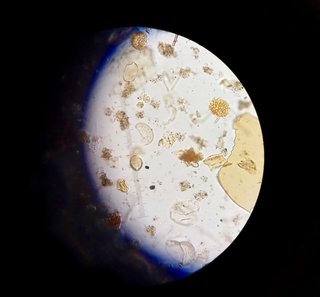Through the start-up honours grant I received from the Graduate School of Geosciences (GSGS) for five months, I engaged actively in the project entitled ‘Late Glacial and Holocene vegetation history of the Ohrid region and pollen-inferred climate variability’ as a Research Assistant at the Institute of Geology and Mineralogy at the University of Cologne. This project was realized within the framework of the International Continental Scientific Drilling (ICDP) at Lake Ohrid (SCOPSCO Project, coordinated by Bernd Wagner) and forms an integral part of the ICDP funded project ‘Insights into the origin of a Mediterranean biodiversity hotspot based on palynological and biomarker analyses of Lake Ohrid sediments from Early Pleistocene (> 1.2 Ma)’ lead by Konstantinos Panagiotopoulos (PA 2664/2-3). Lake Ohrid (FYROM and Albania) is the oldest extant lake in Europe (1.4 Ma) and is a key site for paleoenvironmental and paleoclimate research in the north Mediterranean region.
The main research objectives of this five-month project were: (1) to study the vegetation history at Ohrid over the past 17 ka by means of palynological analysis, (2) to improve our understanding of local plant ecosystem response to short-term climatic oscillations during the Late Glacial transition and the Holocene, and (3) to infer regional vegetation patterns and climatic gradients by comparing the new Lake Ohrid pollen record with other regional pollen records such as Prespa, Maliq and Elefsis.
A total of 110 pollen samples were processed in the pollen laboratory of the National and Kapodistrian University of Athens (in close collaboration with Katerina Kouli) and in the pollen laboratory of the Institute of Geography at the University of Cologne (in collaboration with Frank Schäbitz). A minimum pollen sum of 500 hundred terrestrial pollen grains excluding pines was counted per sample. Sample cross-counting was performed in order to ensure the compatibility with other study intervals at Ohrid or neighboring pollen records (i.e. Lake Prespa). First results were presented at the European Palaeobotany and Palynology Conference (EPPC) in August 2018 at Dublin thanks to a GSGS travel grant I received (Kyrikou et al., 2018).
A high-resolution pollen record from Lake Ohrid (DEEP) will be published within the following months, while a subset of the total samples analyzed are included in a manuscript entitled ‘Landscape threshold crossed on the Balkan Peninsula during the Early to mid-Holocene’ submitted to the Global and Planetary Change journal (Francke et al., in review).
I would like to thank the Graduate School of Geosciences and its Steering Committee for this great opportunity they gave to me for accomplishing my research project and working along with other members of the SCOPSCO science team. I would also like to thank my supervisors Professor Dr. Bernd Wagner and Dr. Konstantinos Panagiotopoulos and my advisor Prof. Dr. Katerina Kouli for their support, guidance and constructive comments. Last but not least, this GSGS start-up honours grant paved the way to find a future PhD position by creating a valuable network at the University of Cologne as well as giving interviews within Germany and abroad.
Styliani Kyrikou, Katerina Kouli, Alexander Francke, Niklas Leicher, Bernd Wagner, Konstantinos Panagiotopoulos (2018): Late Glacial and Holocene vegetation history of south Balkan: a comparison between the new pollen archives of Lakes Ohrid and Prespa. EPPC 2018, Dublin 12-17 August 2018. Book of abstracts pp.47. (http://eppc2018.ie/wp-content/uploads/2018/08/Abstracts-Book-Download-Version.pdf).
Alexander Francke, Anthony Dosseto, Konstantinos Panagiotopoulos, Niklas Leicher Jack H. Lacey, Styliani Kyrikou, Bernd Wagner, Giovanni Zanchetta, Katerina Kouli, and Melanie J. Leng (in review). Landscape threshold crossed on the Balkan Peninsula during the Early to Mid-Holocene. Journal of Global and Planetary Change.
Styliani Kyrikou
Institute of Geology and Mineralogy, University of Cologne
ICDP Project: ‘Insights into the origin of a Mediterranean biodiversity hotspot based on palynological and biomarker analyses of Lake Ohrid sediments from Early Pleistocene (> 1.2 Ma)’
Research project: ‘Late Glacial and Holocene vegetation history of the Ohrid region and pollen-inferred climate variability’
Supervisors: Konstantinos Panagiotopoulos, Bernd Wagner (University of Cologne)
Advisor: Katerina Kouli (National and Kapodistrian University of Athens)
